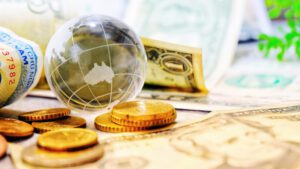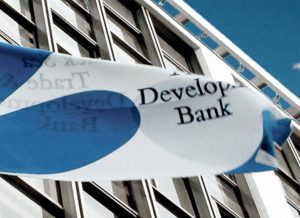
The U.S. economy will enter recession in the coming months, Jeff Gundlach, head of investment company DoubleLine Capital, said on CNBC.
According to Gundlach, only a rise in unemployment is needed for a recession to begin under current conditions. The Federal Reserve (Fed) will need to take “very decisive” action, he believes, and expects the regulator to lower interest rates this year.
Since March 3, the two-year U.S. Treasury yield has fallen about 100 basis points to 4.078%. Until it recovers, the Fed won’t raise rates, Gundlach believes.
The Fed has been tightening monetary policy throughout the year. As Bloomberg notes, this forces investors to reallocate capital in favor of cash and instruments with yields higher than deposit rates, including Treasury bills and units of money market funds.

Recession will affect one third of the world economy in 2023, Managing Director of the International Monetary Fund (IMF) Kristalina Georgieva has predicted.
This year will be tougher on the world economy than the one we left behind, she warned.
“Why? Because the three major economies — the U.S., the EU and China — are slowing down at the same time,” the IMF chief said in an interview broadcast Sunday on CBS. – “We expect one-third of the world economy to be in recession.
Even in countries whose economies won’t decline, “hundreds of millions of people will feel it as a recession,” she added.
While the U.S. may eventually avoid a recession, the situation looks bleaker in Europe, which has been hit hard by Russia’s war against Ukraine, Georgieva said. “Half of the European Union will be in recession,” she noted.
“For the first time in 40 years, China’s growth in 2022 is likely to be at or below global growth,” Georgieva said. – Before the COVID-19 pandemic, China accounted for 35-40% of global growth. It won’t be like that anymore.”
These are “pretty stressful” times for Asian economies, she said.
“When I talk to Asian leaders, they all start with the question: what will happen to China? Will China return to a higher growth rate?” she said.
Georgieva expects China to gradually move to a “higher economic performance and end the year with better results” than it began.
The IMF predicts that global GDP will increase by 2.7% this year after growing 3.2% in 2022.
More than 60% of CEOs and other top managers of companies around the world are afraid of a recession in their countries in the next 12-18 months, according to a survey conducted by the research company Conference Board.
Another 15% of respondents believe that their economies have already entered a recession.
The survey shows a sharp deterioration in sentiment among CEOs around the world. At the end of 2021, only 22% of respondents in a similar study noted recession risks, at the end of 2020 – 39%.
As part of the study, the Conference Board interviewed 750 directors of companies from different countries. The survey was conducted in May, that is, before the recent increase in the Fed’s rate by 75 basis points at once.
Top managers named the consequences of the war unleashed by Russia in Ukraine, problems in supply chains and the situation with coronavirus in China, as well as rising interest rates, as the main negative factors.
In addition, directors are concerned about rising energy prices, causing an increase in the cost of transport services.
“Fundamental economic factors such as rising energy prices and the implications for the cost of goods and transportation services are very important,” said George Oliver, chief executive officer of diversified industrial corporation Johnson Controls.
On fears of a recession, some companies have announced a suspension of hiring new employees or even layoffs.
“There is reason to believe that we are entering a recession phase after a 10-year period of economic growth,” Brian Armstrong, head of crypto exchange operator Coinbase, wrote in a letter to employees. “The recession means another winter in the cryptocurrency market, which may turn out to be long.”
Earlier, Coinbase announced plans to lay off 18% of the state, or about 1.1 thousand employees.
At the same time, companies in the United States are also facing another difficulty – a shortage of qualified personnel. This is facilitated by very low unemployment, which reached 3.6% in March.
Meanwhile, consumer confidence remains strong, said Conference Board senior economist Dana Peterson.
“Consumers are less worried about a recession than CEOs,” Peterson said. “But CEOs are trained to look at a 12 to 18-month horizon, and for most consumers, the horizon is three to six months.”

The Black Sea Trade and Development Bank (BSTDB) predicts an economic decline in the Black Sea region of more than 5% of GDP in 2020 with a further recovery of 3-3.5% of GDP in the next two years, president of the bank Dmytro Pankin has said.
“What we know is that the Black Sea region (along with the rest of the world) is going to experience contraction in 2020, most likely in excess of 5%. However, due to the low base, we expect a rebound in 2021 and probably well into 2022, leading to growth averaging 3.0-3.5% in 2021-2022,” Pankin said in an exclusive interview with Interfax-Ukraine.
“Despite the contraction observed in 2020, there is still a robust demand for BSTDB financing, which our bank is happily providing, although the nature of the demand has changed. Many large-scale investments have been deferred, or even cancelled, and we are seeing more demand for direct corporate lending, and for support to SMEs through local financial institutions. We would expect this demand to increase as economies rebound in 2021 and 2022, in parallel to a rebound in larger investments and infrastructure operations,” the banker said.
“As we all know, relaxed monetary policies and expansionary fiscal policies have resulted in ample global liquidity, which benefits both developed and developing countries. As a development bank, we try to direct this cheap financing to real economic activities both in Ukraine and other countries,” he said.
“However, issues with political stability can inhibit or at best, postpone those investments. To fully take advantage of this ample liquidity Ukraine and all other countries need stability, working rule of law, good governance, and other related factors in place. This is particularly relevant for infrastructure investments,” he said.